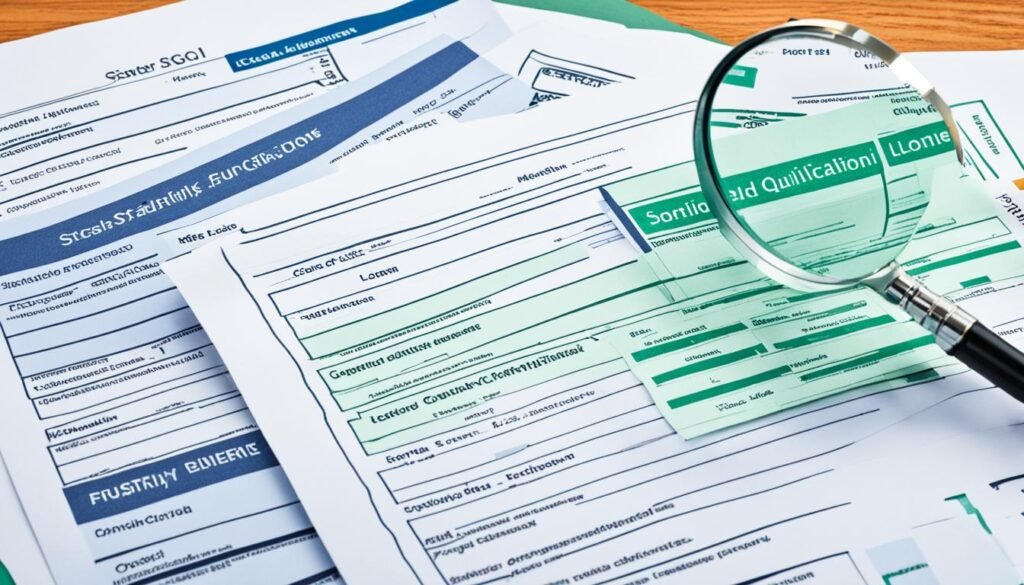Are you considering buying an existing business? Purchasing an established business can offer numerous advantages over starting from scratch, such as an existing customer base and cash flow. However, securing the necessary financing for this endeavor is crucial. In this article, we will explore how to get a loan to buy a business and the key factors to consider in the process.
Key Takeaways: How To Get A Loan To Buy A Business
- Buying an existing business has advantages like an established customer base and existing cash flow.
- Qualifications for a business acquisition loan typically include a good credit score, solid credit history, business experience, and a healthy business to purchase.
- Securing financing requires gathering personal and business documents, such as tax returns and financial statements.
- Various financing options are available, including traditional bank loans, SBA loans, and online business loans.
- If traditional financing options are not available, alternative options like seller financing, borrowing from friends and family, or seeking investors or partners can be considered.
Advantages of Buying a Business
When considering entrepreneurship, buying an existing business can offer numerous advantages. Let’s explore some of the key benefits:
- Established customer base: Purchasing a business that already has a loyal customer base means you don’t have to start from scratch. This provides immediate revenue and reduces the time and effort required to build a customer network.
- Existing cash flow: With an established business, you’ll have the advantage of existing cash flow from day one. This can help cover operational expenses and ensure a steady income stream while you navigate the challenges of business ownership.
These advantages of buying a business can significantly impact your ability to secure a small-business loan. Lenders are often more inclined to provide financing to businesses with a proven track record and existing customer base, as it reduces the risk associated with loan repayment.
Moreover, having a stable customer base and cash flow can improve your financial outlook, making it easier to meet the requirements for a loan. You can showcase the business’s financial health and demonstrate your ability to generate revenue, increasing your chances of obtaining the financing you need.
Remember, the advantages of buying a business go beyond the initial stage. The established customer base and existing cash flow can provide a solid foundation for growth and future success.
Buying an existing business not only saves you time and effort but also allows you to leverage the advantages of an established customer base and existing cash flow.
These advantages make buying a business an attractive option, especially for aspiring entrepreneurs who value stability and want to hit the ground running.
Loan Qualifications

Qualifying for a loan to buy a business requires meeting certain criteria set by lenders. Here are the key qualifications you need to consider:
1. Personal Credit
Your personal credit score plays a crucial role in securing a loan to buy a business. Lenders evaluate your creditworthiness based on factors like payment history, credit utilization, and length of credit history. A good credit score demonstrates your ability to manage debt responsibly and increases your chances of loan approval.
2. Solid Credit History
In addition to a good credit score, lenders also consider the overall quality of your credit history. A solid credit history means that you have a consistent record of making timely payments and managing your debts effectively. This gives lenders confidence in your ability to repay the loan and increases your chances of approval.
3. Business Experience
Demonstrating relevant business experience is important when applying for a loan to buy a business. Lenders want to see that you have the necessary skills and knowledge to successfully operate the business you plan to purchase. Providing details of your previous business experience can strengthen your loan application.
4. Business Credit Record
In addition to personal credit, lenders also review the business credit record of the business you intend to buy. This record includes details of the business’s previous debts, payment history, and overall creditworthiness. A strong business credit record increases the likelihood of loan approval and may even help you secure more favorable loan terms.
Note: Loan qualifications may vary depending on the lender. It’s important to thoroughly research and understand the specific requirements of each lender before applying for a loan to buy a business.
Loan Qualifications Comparison
| Qualification | Personal Credit | Solid Credit History | Business Experience | Business Credit Record |
|---|---|---|---|---|
| Requirement | Good credit score | Consistent payment history | Relevant business experience | Strong credit record for the business |
| Importance | High | High | Medium | Medium |
| Potential Impact | Increases chances of approval | Increases chances of approval | Strengthens loan application | Increases likelihood of approval |
Assessing the Business

When applying for a loan to buy a business, it’s important to assess the health and value of the business you are interested in. Lenders will ask for documentation to evaluate the financial stability of the business and determine if it’s a viable investment opportunity.
One crucial aspect of assessing the business is determining its value. You need to understand the fair market value of the business to negotiate a price that aligns with its worth. This involves reviewing the company’s financial statements, such as balance sheets and profit and loss statements, as well as considering factors like the business’s assets, customer base, goodwill, and potential for growth.
Additionally, it’s essential to evaluate any past-due debts that the business may have. These debts can impact the financial health of the business and its ability to generate future profits. Lenders will want to ensure that these debts are manageable and won’t pose a significant risk to your investment.
By thoroughly assessing the business’s value and understanding its financial obligations, you can make informed decisions when it comes to securing financing for your business acquisition.
Below is a table summarizing the key factors to consider when assessing the business:
| Factors to Consider | Description |
|---|---|
| Financial Statements | Review the company’s balance sheets and profit and loss statements to understand its financial performance. |
| Assets | Evaluate the value of the business’s assets, including property, equipment, inventory, and intellectual property. |
| Customer Base | Assess the size and loyalty of the business’s customer base to understand its revenue potential. |
| Goodwill | Determine the value of the business’s brand reputation and relationships with customers and suppliers. |
| Potential for Growth | Evaluate the business’s growth prospects and identify opportunities for expansion or market penetration. |
| Past-Due Debts | Assess any outstanding debts that the business may have and evaluate their impact on its financial stability. |
Loan Application Process

When you’re ready to apply for a loan to buy a business, it’s important to understand the loan application process. This involves gathering personal documents as well as business documents from the current owner. The lender will use these documents to assess your eligibility and determine the terms of your loan.
Gathering Personal Documents
As part of the loan application process, you’ll need to provide personal documents that demonstrate your financial stability and creditworthiness. These documents typically include:
- Tax returns: Recent personal tax returns, usually for the past two to three years, to verify your income and assess your tax obligations.
- Bank statements: The most recent bank statements for your personal accounts, which will be used to evaluate your financial stability and assess your ability to repay the loan.
Gathering Business Documents
In addition to personal documents, you’ll also need to collect business documents from the current owner. These documents provide essential information about the business and its financial health. The specific documents required may vary depending on the lender, but commonly requested documents include:
- Tax returns: The business’s tax returns for the past two to three years, which allow the lender to assess the financial performance and profitability of the business.
- Financial statements: Balance sheets, income statements, and cash flow statements that provide an overview of the business’s financial position and performance.
Gathering these documents in advance will help streamline the loan application process and ensure that you’re prepared to provide the necessary information to the lender. Remember to keep copies of all documents for your own records.
Once you have all the required documents, you can submit your loan application to the lender. The lender will review your application and documentation to assess your creditworthiness and evaluate the business you wish to purchase. It’s important to be thorough and accurate in your application to increase your chances of approval.
Where to Get a Business Loan

When seeking financing to buy a business, it’s essential to explore different options for obtaining a business loan. Here are some of the common sources where you can secure the funding you need:
1. Traditional Banks
Traditional banks are a well-established choice for business loans. They offer competitive interest rates, personalized service, and a wide range of loan products. It’s worth considering local and national banks to compare loan terms and requirements.
2. Credit Unions
Credit unions are member-owned financial institutions that can provide business loans at lower interest rates compared to traditional banks. If you have a good relationship with a credit union, it’s worth exploring their loan offerings and eligibility criteria.
3. SBA Loans
The Small Business Administration (SBA) offers loan programs designed to support small businesses. SBA loans are partially guaranteed by the SBA, making them more accessible to borrowers. Partnering with an SBA-approved lender can increase your chances of obtaining favorable loan terms.
4. Online Business Loans
The rise of online lenders has revolutionized the business lending landscape. Online lenders provide quick and convenient access to business loans, often with flexible qualification requirements. However, keep in mind that interest rates may be higher compared to traditional bank loans.
Each financing option has its own set of requirements and potential benefits. It’s crucial to thoroughly research and compare the terms, interest rates, and repayment options offered by different lenders before making a decision.
Ultimately, the right choice will depend on your individual needs, creditworthiness, and the specific requirements of the lender.
Comparison of Business Loan Options
| Lender | Interest Rates | Loan Amounts | Qualification Requirements | Application Process |
|---|---|---|---|---|
| Traditional Banks | Low | Varies | Good credit score, strong business financials | In-person application with extensive documentation |
| Credit Unions | Low | Varies | Membership requirements, good credit history | In-person or online application |
| SBA Loans | Low to moderate | Up to $5 million | Good credit score, collateral, business plan | Application through an SBA-approved lender |
| Online Business Loans | Moderate to high | Up to $500,000 | Flexible qualification requirements | Online application with minimal documentation |
Table: A comparison of different business loan options available for aspiring business buyers.
Online Business Loans
When it comes to securing financing for your small business, online loans can be a convenient option. Online lenders offer flexible qualification requirements, making it easier for entrepreneurs to access the funds they need. Whether you’re looking to expand your existing business or launch a new venture, online business loans can provide the financial support you require.
One of the primary advantages of online business loans is the flexibility in qualification. Unlike traditional banks, online lenders often consider a broader range of factors when evaluating loan applications. This means that even if you have a less-than-perfect credit score or limited business history, you may still be eligible for a loan.
However, it’s essential to note that online business loans may come with higher interest rates compared to traditional bank loans. This is because online lenders typically take on more risk by offering loans to borrowers with flexible qualifications. It’s crucial to carefully consider the interest rates and repayment terms before committing to an online loan to ensure it aligns with your financial goals.
Despite the higher interest rates, online business loans can be an excellent option for entrepreneurs who need quick access to capital and don’t meet the strict criteria of traditional lenders. These loans can provide the necessary financial boost to fuel growth and pursue new opportunities.
Benefits of Online Business Loans:
- Flexible qualification requirements.
- Quick and convenient application process.
- Access to funds for various business needs.
Considerations for Online Business Loans:
- Higher interest rates compared to traditional bank loans.
- Repayment terms and fees associated with the loan.
- Thoroughly review the lender’s reputation and customer reviews.
Overall, online business loans can offer small business owners the financial flexibility they need to pursue their goals. By understanding the qualifications and considering the interest rates, entrepreneurs can make informed decisions when it comes to financing their business ventures.
Traditional Bank Loans

When it comes to securing financing for your business acquisition, traditional bank loans can be an excellent option. These loans typically offer lower interest rates and more favorable terms compared to alternative financing options. If you have a strong credit history and a minimum number of years in business, a traditional bank loan may be the ideal choice for you.
A strong credit history is crucial when applying for a traditional bank loan. Lenders will carefully evaluate your creditworthiness to determine the interest rate and loan terms. A higher credit score demonstrates your ability to manage debt responsibly and increases your chances of securing a loan with lower interest rates. On the other hand, a history of late payments or high levels of debt may result in higher interest rates or even loan denial.
Additionally, traditional banks often require a minimum number of years in business to qualify for a loan. This requirement ensures that you have sufficient experience and stability in managing a business. The specific minimum years in business may vary between lenders, but it is generally around two to three years.
Pro Tip: Before applying for a traditional bank loan, take steps to build and strengthen your credit history. Make sure to pay your bills and debts on time, maintain a low credit utilization ratio, and regularly monitor your credit report for any errors or discrepancies.
Securing a traditional bank loan for your business acquisition can provide you with the necessary funds at a more affordable cost. With lower interest rates, you can save money in the long run and allocate more resources towards growing and expanding your business. However, it’s essential to meet the requirements of a strong credit history and the minimum number of years in business to increase your chances of loan approval.
Let’s take a closer look at how traditional bank loans compare to other financing options:
| Financing Option | Interest Rates | Eligibility Criteria | Advantages |
|---|---|---|---|
| Traditional Bank Loans | Lower | – Strong credit history – Minimum years in business |
– Favorable terms – Potential for lower costs |
| Online Business Loans | Higher | – Flexible qualification requirements | – Quick and convenient application process |
| SBA Loans | Varies | – Partial guarantee from the SBA | – Easier qualification for small businesses |
As you can see, traditional bank loans stand out with their lower interest rates and the requirement of a strong credit history and minimum years in business. However, it’s essential to carefully consider your options and compare them based on your unique financial situation and business needs.
Now that you have a good understanding of traditional bank loans, let’s explore another popular financing option: SBA loans.
SBA Loans

When it comes to financing the purchase of a business, SBA loans are a popular option for small business owners. These loans are partially guaranteed by the Small Business Administration, making them easier to qualify for compared to traditional bank loans.
Banks and credit unions frequently offer SBA loans in addition to their other loan products. The Small Business Administration provides a partial guarantee to the lender, reducing the risk for financial institutions and increasing the likelihood of approval for small business owners.
SBA loans offer several advantages for borrowers. First, the partial guarantee from the Small Business Administration allows lenders to offer more flexible terms and lower interest rates. This can significantly reduce borrowing costs for business owners, making it an attractive financing option.
In addition, SBA loans often have longer repayment terms compared to traditional bank loans. This allows business owners to spread out their loan payments over a longer period, helping to manage cash flow and reduce the burden of monthly payments.
Small business owners who may not meet the strict requirements of traditional bank loans can benefit from the more lenient qualification criteria of SBA loans. The Small Business Administration takes into account factors such as the business owner’s credit score, business experience, and the financial health of the business they are purchasing.
Overall, SBA loans provide small business owners with a valuable financing option that includes a partial guarantee from the Small Business Administration, making it easier to qualify for. With favorable terms and lower interest rates, these loans can help business owners secure the funding they need to purchase an existing business.
| Advantages of SBA Loans | Disadvantages of SBA Loans |
|---|---|
|
|
Alternative Financing Options

While traditional financing options like bank loans are often the first choice for securing funds to buy a business, they may not always be available or suitable for everyone. In such cases, alternative financing options can provide a viable solution. Some alternative options to consider include:
Seller Financing
Seller financing, also known as owner financing, involves the seller of the business acting as the lender. In this arrangement, the buyer makes regular payments to the seller, typically with interest, until the full purchase price is paid off. This option can be attractive for buyers who may have difficulty obtaining a traditional loan or who want more flexibility in the terms of the financing.
Borrow from Friends and Family
Another alternative financing option is to borrow from friends and family. This can be a favorable choice as it may come with flexible repayment terms and potentially lower interest rates. However, it’s important to approach this option with caution and ensure clear communication and legal documentation to avoid strain on personal relationships and future conflicts.
Seek Investors or Partners
If you’re open to sharing the ownership and profits of the business, seeking investors or partners can be a viable alternative financing option. Investors or partners can provide the necessary capital in exchange for ownership stakes or a share of the profits. This option can also bring additional expertise, networks, and support to help grow the business.
When considering alternative financing options, it’s essential to carefully evaluate the pros and cons of each and assess their suitability for your specific situation. While these options can offer flexibility and accessibility, they may come with certain risks and considerations. Consulting with a financial advisor or business consultant can help you make an informed decision.
| Alternative Financing Option | Pros | Cons |
|---|---|---|
| Seller Financing | Flexibility in terms May be easier to qualify for No need for traditional lenders |
Potentially higher interest rates Reliant on seller’s cooperation Limited funding available |
| Borrow from Friends and Family | Potentially lower interest rates Flexible repayment terms Less stringent qualification criteria |
Possible strain on personal relationships Limited funding available Lack of professional guidance |
| Seek Investors or Partners | Access to additional capital Expertise and networks Shared risks and responsibilities |
Potential loss of control Shared profits and decision-making Alignment of goals and vision |
Exploring alternative financing options can open up new possibilities for acquiring the funds needed to buy a business. By considering seller financing, borrowing from friends and family, or seeking investors or partners, you can increase your chances of securing the necessary capital and achieve your entrepreneurial ambitions.
Also Read: Best Business Capital Loans: Securing Financial Growth
Conclusion
Securing financing to buy a business requires careful consideration of qualifications, documentation, and the selection of the right financing option. Key factors to keep in mind include your personal credit, business experience, and the health of the business you intend to purchase. By taking these elements into account, you can successfully navigate the loan application process and secure the necessary funding to acquire an existing business.
When it comes to securing financing, having a good credit score and solid credit history is essential. Lenders will assess your creditworthiness to determine your eligibility for a business loan. Additionally, having relevant business experience will boost your credibility and increase your chances of getting approved for financing.
It’s also important to carefully evaluate the health of the business you plan to buy. Lenders will request documentation to assess its value and any outstanding debts. Ensuring that the business is financially stable and has a promising future will greatly improve your chances of obtaining a loan.
Lastly, selecting the right financing option is crucial. Traditional bank loans typically offer lower interest rates, while online lenders may offer more flexible qualifications. The Small Business Administration (SBA) loans, with their partial guarantee, provide another viable option. Consider your specific needs and weigh the pros and cons of each option to make an informed decision.
FAQs
Q: What is a business acquisition loan?
A: A business acquisition loan is a type of financing used to buy an existing business. It is designed for individuals who want to purchase an established company.
Q: How can I apply for a business loan to buy a business?
A: To apply for a business loan to buy a business, you will typically need to provide a detailed business plan, documents from the current business, and information on how you plan to use the loan funds.
Q: What are the best small business loan terms to look for?
A: When considering small business loan terms, it’s important to look for terms that offer a reasonable interest rate, manageable repayment schedule, and flexible loan agreement.
Q: What type of financing is available for small business owners?
A: Small business owners can access a variety of loan options, including term loans, lines of credit, and business loans specifically tailored for startups or business acquisitions.
Q: How do I get approved for a business loan?
A: To get approved for a business loan, you will need to demonstrate the ability to repay the loan, provide a detailed business plan, show a strong credit history, and have sufficient collateral.
Q: What is the process to apply for a business acquisition loan?
A: To apply for a business acquisition loan, you will need to fill out an application form, provide necessary financial documents, undergo a credit check, and present a solid business plan.
Q: Is it easier to get a loan to buy an existing business or start a new one?
A: Generally, it can be easier to get a loan to buy an existing business as lenders may see less risk in providing financing for a business that is already established.




